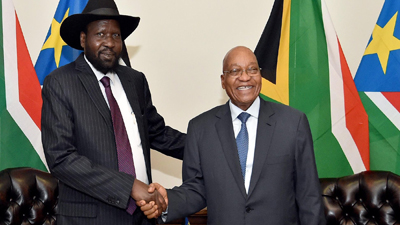
A South Sudanese official has requested the South African government to ensure the armed opposition leader, Riek Machar, who lives in South Africa, is isolated globally.
“There is no such a thing. Riek Machar is still under arrest. He will not be allowed until when he denounces violence and accepts returning to the country as a private citizen,” a cabinet minister in South Sudan’s coalition government told Sudan Tribune Wednesday.
The official, speaking on condition of anonymity, claimed South Sudan President Salva Kiir dispatched Petroleum minister, Ezekiel Gatkuoth to South Africa with a clear message for its authorities.
“The message is asking the ANC [African National Congress] leadership and government to unite their ranks and files and speak one voice with regards to Riek Machar’s activities. He needs to be stopped from talking to the international community. He is using interactions to incite situation back here in the country”, he said.
The minister, who sits on the 28-member council of South Sudan’s ruling party’s (SPLM) political bureau, said the government had agreed that Machar will only return to the country if he denounces violence.
“President Kiir and Riek have developed personal hatred that they can never sit down and work together peacefully. They have reached a situation [where] they never work together and so it is better one of them is kept out if there has to be peace”, he said.
Meanwhile, Gordon Buay, South Sudan’s acting head of mission to the United States, posted a picture of the Petroleum minister meeting South Africa’s parliament speaker and commended the meeting.
He said Gatkuoth strengthened Machar’s detention in South Africa.
“The complete detention of the prophet of doom masquerading as a vicar of Ngundeng is already taken care of by Amb. Ezekiel Lol Gatkuoth”, wrote Buay on his Facebook page on Wednesday.
In September 2012, South Africa signed an agreement establishing diplomatic relations with the young nation, a year after the latter attained independence.
The agreement was expected to lay the basis for the conclusion of other agreements, particularly economic and trade-related frameworks, aimed at promoting two-way trade and investment between the two countries.
(ST)
